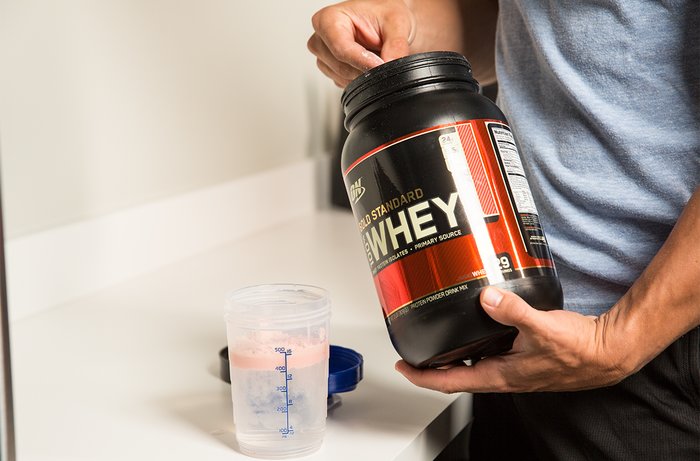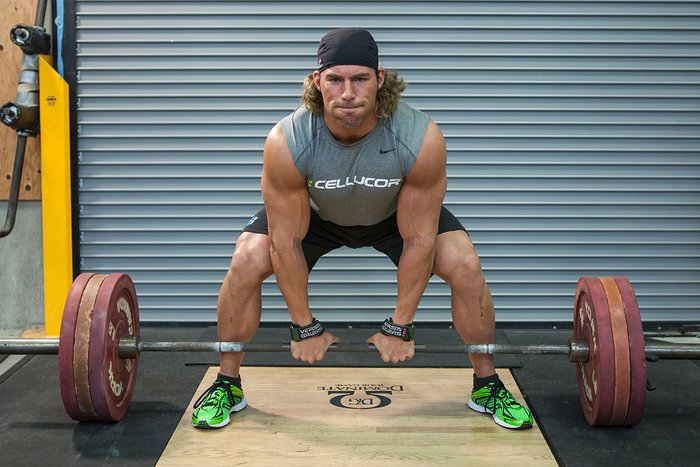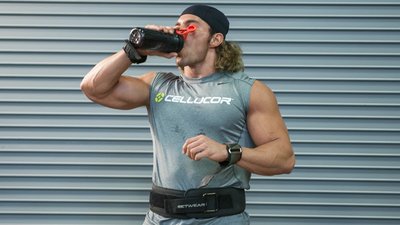Should I Drink Protein Before Or After A Workout?
You can take in protein or amino acids pre- and post-workout, but if I absolutely had to pick one time, I'd say pre-workout. Sacrilege, you say! If you're more upset than a cat kicked off a ledge, give me time to explain before you claw my face off.
Post-workout shakes have long been considered the most important pieces of the workout nutrition puzzle. Recent research suggests, however, that ingesting protein and amino acids prior to training may be even more beneficial.
Hang in there, kitty. Here's why:
Fuel Your Muscles
Pre-workout protein, specifically the branched chain amino acids (BCAAs), will help fuel your muscles during training. BCAAs don't need to be processed by your liver; after being absorbed, they head directly to your blood stream to be picked up by your muscles.
This is key because exercise causes the breakdown and oxidation of BCAAs. Providing BCAAs to working muscles will prevent the need for your body to catabolize the working muscle itself.
Increase Protein Synthesis
Adding protein prior to your training session primes the pump: It starts protein synthesis during rather than after your training session.
Pre-workout protein shakes most likely increases amino acid delivery and uptake by muscles during training.
Taken alone or as part of a complete protein, BCAAs inhibit muscle breakdown. So net protein synthesis is elevated even higher!
Burn More Calories
A study published in Medicine and Science in Sports & Exercise found that one scoop of whey protein prior to working out increased calorie burning over the subsequent 24 hours.
The exact cause of this increase in calorie burning is unknown, but it may be due to the added metabolic effects of increasing protein and modifying substrates (energy sources) used during exercise.
Don't wait for the eggheads: It's okay to reap the benefits of the what (increased calorie burning!) without knowing the why (exact metabolic cause).

A study published in Medicine and Science in Sports & Exercise found that one scoop of whey protein prior to working out increased calorie burning over the subsequent 24 hours.
Carryover Effect
There is also a carryover effect of nutrients taken in the pre-workout period. After ingesting protein, muscle protein synthesis can stay elevated as long as 3 hours.
This means that pre-workout protein allows you to double dip: You reap the benefits of elevated blood amino acids during your training session in addition to a carryover of elevated blood amino acid levels after your workout.
This elevation of blood amino acids will also help prevent excessive post-workout muscle breakdown.
This occurs partly through the reduction of the muscle-catabolizing hormone cortisol. A 2007 study published in the Journal of Strength and Conditioning Research found that starting your workout nutrition with a protein-and-carbohydrate shake 30 minutes prior to exercise led to a significant reduction in cortisol up to one day following the training session.
Fat-Burning Bonus
Taking protein (specifically BCAAs) alone before a workout is extremely beneficial during a low-carb diet. The consumption of pre-workout BCAAs, especially when glycogen levels are low (as they are during a low-carb diet), leads to an increase in fat oxidation (fat-burning) during high-intensity exercise like interval training or metabolic resistance training.

The nutrients you ingest around your workouts are extremely critical to developing and refining your physique.
The Winner: Pre-Workout Protein
The nutrients you ingest around your workouts are extremely critical to developing and refining your physique. If you skip pre-workout protein, you skip a chance to support intra-workout anabolism (muscle growth AND reduce post-workout catabolism (muscle breakdown).
Provided that you're getting adequate dietary protein throughout the day, I recommend BCAAs pre-workout. Their free form offers much faster absorption and uptake, which means your blood amino levels will be high when you hit the training floor.

